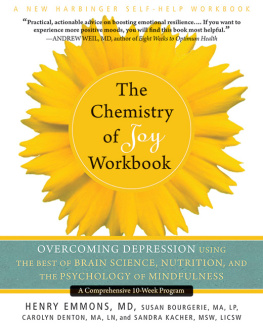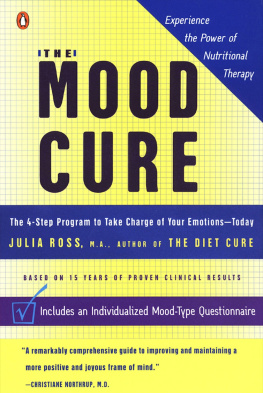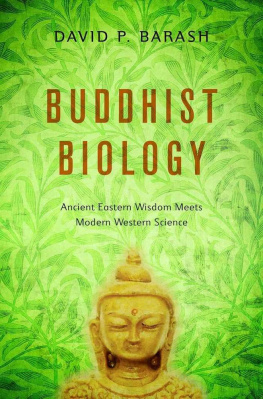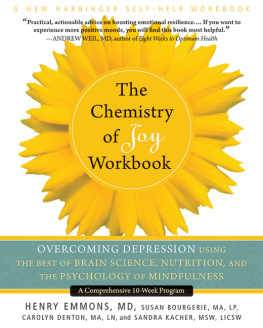


FIRESIDE
Rockefeller Center
1230 Avenue of the Americas
New York, NY 10020
www.SimonandSchuster.com
Copyright 2006 by Henry Emmons
All rights reserved, including the right of reproduction in whole or in part in any form.
FIRESIDE and colophon are registered trademarks of Simon & Schuster, Inc.
Designed by Ruth Lee-Mui
Library of Congress Cataloging-in-Publication Data
ISBN: 0-7432-8239-6
eISBN-13: 978-0-74328-239-0
Visit us on the World Wide Web:
http://www.SimonSays.com
This book is dedicated to all who suffer from inner states of fear, anger, or sadness. May your reading of this work provide you with comfort and courage and give you greater skill in facing depression in all of its forms. And it is also dedicated to the healers who work with these patients. May you be filled with kindness and compassion and find ways to sustain yourselves over a lifetime of service.
You are all unsung heroes.
CONTENTS
The
CHEMISTRY
of
JOY
A Three-Step Program for Overcoming Depression
Through Western Science and Eastern Wisdom
1
THE MYSTERIOUS MIX OF SCIENCE AND SPIRIT
Surely joy is the condition of life.
HENRY DAVID THOREAU
I magine for a moment a cardiologist seeing a new patient. The man smokes, is forty pounds overweight, and subsists on a diet of pizza, french fries, and Big Macs. He works at a stressful job that leaves him agitated at the end of every fourteen-hour day, and his most strenuous exercise is walking from his office to the parking lot. He has a family history of heart disease, and his blood pressure and cholesterol are through the roof.
Okay, says the cardiologist after he reviews the results of the tests, conducted by the nurse and a junior associate. He himself has spent just ten minutes with this patient, and already hes late for his next appointment. Heres something to help your cholesterol go down, and something for your pressure. You shouldnt have many side effects, though you might experience some memory problems, and, of course, a loss of sex drive. But I wouldnt worry about it. Good luck, and Ill see you in three months when your prescription runs out.
You dont even have to be a first-year medical student to see whats wrong with this picture. Wait a minute, you say. Why didnt the doctor tell his patient to stop smoking, eat better, get more exercise, and find some strategies for coping with stress? Why isnt he monitoring the patient more carefully? And why is the patients only option medications that, while they may save his life, will make it even less pleasant?
At this point, wed never think of treating heart disease in such a limited fashion. It may have taken a while, but both the medical community and the general public have finally adopted an integrated approach to this potentially fatal illness. Yet depressiononce viewed entirely as a psychological or spiritual problemis now treated almost exclusively with medication alone by the vast majority of the medical establishment. While its hard to imagine the cardiologist who would treat a heart patient in the way Ive described, some version of this scenario would be not at all unusual for a harried psychiatrist at an HMO, under pressure to find the quickest and most cost-effective treatment for depression, nor for the family doctors who prescribe antidepressants while ignoring their patients diet, exercise, and lifestyle. Even responsible, caring physicianspsychiatrists as well as general practitioners are unaware that depression requires a brain-healthy diet and lifestyle to mirror the heart-healthy regime that weve come to know so well. Even well-meaning psychiatrists tend to see depressed patients as brain chemistry gone awry rather than as a complex integration of mind, body, and spirit. And many patients who try to eat well, exercise frequently, and live a healthy life remain ignorant of the specific diet and lifestyle choices that might cure their insomnia, lift their moods, soothe their anxiety, and generally ease their depression.
Depression is a holistic illness that affects every aspect of who we are as human beings. It only makes sense to address it from every available angle, both with regard to our bodies and brain chemistry and vis--vis our psyches and spirits. So in this book, I offer you a revolutionary model for treating depression, one that integrates physical, mental, and spiritual approaches to help you discover the chemistry of joythat mysterious mix of body, mind, and spirit that Thoreau called the condition of life.
I believe that no matter how much pain each of us is given to endureand for some of us, the burden is considerablewe can also always access the joy that is our birthright. But to find the joy were all meant to experience, we need to understand ourselves fully, including our physical, emotional, and spiritual needs. A program for overcoming depression that omits any one of these aspects of our humanity is almost certain to fail.
A THREE-STEP PROGRAM TO CREATING JOY
My approach to overcoming depression and creating joy is based on two decades of work as a psychiatrist who has also studied Jungian psychology, Christian theology, Buddhist philosophy, Ayurvedic medicine, and the groundbreaking mindfulness approach to physical and mental health pioneered by Jon Kabat-Zinn and Saki Santorelli. In developing the program Ill share with you here, Ive drawn on the latest developments in Western biochemistry to help me understand the elegant and complex interactions that take place constantly within our extraordinary brain. Ive refined my understanding of diet, exercise, and lifestyle through the Ayurvedic Mind-Body medicine I learned from my study with Deepak Chopra. And Ive deepened my approach to psychotherapy by incorporating a Buddhist Psychology of Mindfulness. Together, Western science and Eastern wisdom have enabled me to create this three-step program.
Step One: Understand Your Brain
Step One is your first line of defense against depression, the techniques to which you turn when youre in the throes of a depressive episode and need immediate help. Its based on the understanding that just as the heart patient needs a heart-healthy lifestyle, so do depressed patients need a brain-healthy program that includes diet, exercise, and a healthy relationship to natural cyclesthe ultradian, circadian, and seasonal rhythms that affect us more than we think.
Although by now even fast-food addicts have the guilty sense that french fries and pizza arent exactly good for our health, very few of us realize that these poor food choices are also disastrous for our mood. Too many refined carbs and unhealthy fats play havoc with our brain chemistry as well as our weight, working against our efforts to overcome depression no matter how much medication we take.
Depending on our individual system, even apparently healthy diets can be bad for our brains. I recently met a man in his fifties who worked out regularly and had a lean, healthy physique. He ate mainly home-cooked, low-fat meals featuring high-quality proteins and fresh fruits and vegetables. But he wasnt getting the complex carbohydrates that he needed to overcome a lifelong serotonin deficiency, nor the healthy Omega-3 fats that his brain craved. As a result he suffered from anxiety, insomnia, and a tendency to depression. When he added more whole grains, legumes, and starchy vegetables into his diet, his mood, sleep, and well-being improved almost instantly. In Step One, youll learn how to tell if you, too, are eating exactly the wrong foods to balance your brain chemistry, with concrete suggestions for how to switch to a brain-healthy diet.
Next page







